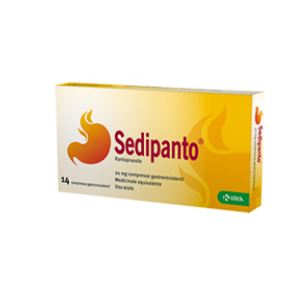Ship in Europe, Find out rates!
Language
Sedipanto Pantoprazole 20mg Krka 14 Gastro-resistant Tablets

Regular Price
€8.10
Special Price
€3.99
-51%
Save: €4.11
In stock
Recent lowest price:
€3.99
- box Delivery in Italy in 24/48 and free returns
- star3.000+ positive reviews
- dropboxOver 60,000 products in the catalog
Manufacturer
KRKA FARMACEUTICI MILANO
SKU
042475020
Active principle
PANTOPRAZOLO SODICO SESQUIDRATO
NAME
SEDIPANTO 20 MG FOOD-RESISTANT TABLETS
PHARMACOTHERAPEUTIC CATEGORY
Proton pump inhibitors.
ACTIVE PRINCIPLES
Pantoprazole 20 mg as pantoprazole sodium sesquihydrate.
EXCIPIENTS
Tablet core: mannitol; crospovidone (type B); anhydrous sodium carbonate; sorbitol (E420); calcium stearate. Film coating: hypromellose; povidone; titanium dioxide (E171); yellow iron oxide (E172); propylene glycol; methacrylic acid-ethyl acrylate copolymer (1: 1) dispersion 30%; sodium lauryl sulfate; polysorbate 80; macrogol 6000; talc.
INDICATIONS
Short-term treatment of reflux symptoms (e.g. heartburn, gastric regurgitation) in adults.
CONTRAINDICATIONS / SECONDARY EFFECT
Hypersensitivity 'to the active substance or to any of the other excipients; concomitant administration with atazanavir.
DOSAGE
The recommended dose is 20 mg of pantoprazole (one tablet) per day. To obtain an improvement in symptoms it may be necessary to take the tablets for 2-3 consecutive days. Once complete relief of symptoms has occurred, treatment can be stopped. Treatment should not exceed 4 weeks without consulting your doctor. In the event that symptom relief is not achieved within 2 weeks of continued treatment, the patient should be advised to consult with the physician. No dose adjustment is necessary in elderly patients or in patients with impaired renal or hepatic function. Pediatric population: the use of the drug is not recommended in children and adolescents under 18 years of age due to insufficient data on safety and efficacy. The 20 mg gastro-resistant tablets should not be chewed or crushed, and should be swallowed whole with a little water before a meal.
STORAGE
Store in the original package to protect the medicine from humidity.
WARNINGS
Patients should consult their physician if: they experience unintentional weight loss, anemia, gastrointestinal bleeding, dysphagia, persistent vomiting or bloody vomiting, as treatment with pantoprazole may relieve symptoms and delay the diagnosis of a serious condition (in these cases, malignant nature must be excluded); have had a previous stomach ulcer or gastrointestinal surgery; have been on continued symptomatic treatment for indigestion or heartburn for at least 4 weeks or more; have jaundice, hepatic impairment, or liver disease; have any other serious pathology that compromises the general state of health; are over 55 with new or recently changed symptoms. Patients with long-term recurrent symptoms of indigestion or heartburn should see their doctor at regular intervals. In particular, patients over the age of 55 who take daily remedies for indigestion or heartburn without a prescription should inform their doctor or pharmacist. Patients should not take another proton pump inhibitor or H2 antagonist concomitantly. Patients undergoing an endoscopy or breath test for urea should consult their doctor before taking this medicine. Patients must be computerized tablets are not intended to provide immediate relief Patients may begin to experience improvement in symptoms after approximately one day of treatment with pantoprazole, but may need to be taken for 7 days to achieve full control of heartburn. . Patients should not take pantoprazole as a preventive therapy. Reduced gastric acidity, due to any reason (including proton pump inhibitors) increases the counts of bacteria normally present in the gastrointestinal tract. Treatment with drugs that reduce gastric acidity may lead to a modest increase in the risk of gastrointestinal infections caused by bacteria such as Salmonella, Campylobacter and C. difficile. The drug contains sorbitol.
INTERACTIONS
The drug can reduce the absorption of active ingredients whose bioavailability is dependent on gastric pH (eg ketoconazole). Co-administration of atazanavir 300 mg / ritonavir 100 mg with omeprazole (40 mg once daily) or atazanavir 400 mg with lansoprazole (60 mg single dose) in healthy volunteers has been shown to cause a substantial reduction in bioavailability. by atazanavir. Absorption of atanazavir is pH dependent. Therefore, pantoprazole should not be administered with atazanavir. Pantoprazole is metabolised in the liver by the cytochrome P450 enzyme system. An interaction with other substances metabolised by the same enzymatic system cannot be excluded. However, no significant interactions were observed in specific tests with carbamazepine, caffeine, diazepam, diclofenac, digoxin, ethanol, glibenclamide, metoprolol, naproxen, nifedipine, phenytoin, piroxicam, theophylline and an oral contraceptive containing levonorgestrel and ethinyl estradiol. Although no interactions were observed during concomitant treatment with phenprocoumon or warfarin in clinical pharmacokinetic studies, some isolated cases of variation in International Normalized Ratio (INR) during concomitant treatment have been observed in the post-marketing period. Therefore, in patients treated with coumarin anticoagulants (e.g. phenprocoumon or warfarin), it is recommended to monitor the prothrombin time / INR when pantoprazole treatment is initiated, when treatment is discontinued or when administered intermittently. Concomitant use of proton pump inhibitors with methotrexate (mainly in high doses) may increase the levels of methotrexate and / or its metabolite hydroxymethotrexate and may cause methotrexate toxicity. Temporary withdrawal of the proton pump inhibitor may be considered in patients treated with high dose methotrexate. There were no interactions with concomitantly administered antacids.
SIDE EFFECTS
Disorders of the blood and lymphatic system. Rare: agranulocytosis; very rare: thrombocytopenia, leukopenia, pancytopenia. Nervous system disorders. Uncommon: headache, dizziness; rare: taste disturbances. Eye disorders. Rare: vision disturbances / blurred vision. Gastrointestinal disorders. Uncommon: diarrhea, nausea / vomiting, abdominal distension and bloating, constipation, dry mouth, abdominal pain and discomfort. Renal and urinary disorders. Not known: interstitial nephritis. Skin and subcutaneous tissue disorders. Uncommon: rash / exanthema / rash, pruritus; rare: urticaria, angioedema; not known: Stevens-Johnson syndrome, Lyell syndrome, erythema multiforme, photosensitivity '. Musculoskeletal and connective tissue disorders. Rare: arthralgia, myalgia. Metabolism and nutrition disorders. Rare: hyperlipidemia and increased lipids (triglycerides, cholesterol), weight changes; not known: hyponatremia, hypomagnesaemia. General disorders and administration site conditions. Uncommon: asthenia, fatigue and malaise; rare: high body temperature, peripheral edema. Disorders of the immune system. Rare: hypersensitivity '(including anaphylactic reactions and anaphylactic shock). Hepatobiliary disorders. Uncommon: increased liver enzymes (transaminases, gamma-GT); rare: increased bilirubin; not known: hepatocellular injury, jaundice, hepatocellular impairment. Psychiatric disorders. Uncommon: sleep disturbances; rare: depression (and all aggravations); very rare: disorientation (and all aggravations); not known: hallucinations, confusion (especially in predisposed patients, as well as worsening of these symptoms in the case of pre-existence). Diseases of the reproductive system. Rare: gynecomastia. The reporting of suspected adverse reactions that occur after the authorization of the drug is important, as it allows continuous monitoring of the benefit / risk ratio of the drug. Healthcare professionals are asked to report any suspected adverse reactions via the national reporting system.
PREGNANCY AND BREASTFEEDING
There are no adequate data from the use of pantoprazole in pregnant women. Studies conducted on animals have shown reproductive toxicity. The potential risk for humans is unknown. The drug should not be used during pregnancy, unless absolutely necessary '. Animal studies have shown the excretion of pantoprazole into breast milk. Excretion into human breast milk has been reported. Therefore a decision whether to continue / discontinue breastfeeding or to continue / discontinue therapy must be made taking into account the benefit of breastfeeding for the infant and the benefit of therapy for the mother. The studies did not show an effect of pantoprazole on the fertility of male or female rats.
SEDIPANTO 20 MG FOOD-RESISTANT TABLETS
PHARMACOTHERAPEUTIC CATEGORY
Proton pump inhibitors.
ACTIVE PRINCIPLES
Pantoprazole 20 mg as pantoprazole sodium sesquihydrate.
EXCIPIENTS
Tablet core: mannitol; crospovidone (type B); anhydrous sodium carbonate; sorbitol (E420); calcium stearate. Film coating: hypromellose; povidone; titanium dioxide (E171); yellow iron oxide (E172); propylene glycol; methacrylic acid-ethyl acrylate copolymer (1: 1) dispersion 30%; sodium lauryl sulfate; polysorbate 80; macrogol 6000; talc.
INDICATIONS
Short-term treatment of reflux symptoms (e.g. heartburn, gastric regurgitation) in adults.
CONTRAINDICATIONS / SECONDARY EFFECT
Hypersensitivity 'to the active substance or to any of the other excipients; concomitant administration with atazanavir.
DOSAGE
The recommended dose is 20 mg of pantoprazole (one tablet) per day. To obtain an improvement in symptoms it may be necessary to take the tablets for 2-3 consecutive days. Once complete relief of symptoms has occurred, treatment can be stopped. Treatment should not exceed 4 weeks without consulting your doctor. In the event that symptom relief is not achieved within 2 weeks of continued treatment, the patient should be advised to consult with the physician. No dose adjustment is necessary in elderly patients or in patients with impaired renal or hepatic function. Pediatric population: the use of the drug is not recommended in children and adolescents under 18 years of age due to insufficient data on safety and efficacy. The 20 mg gastro-resistant tablets should not be chewed or crushed, and should be swallowed whole with a little water before a meal.
STORAGE
Store in the original package to protect the medicine from humidity.
WARNINGS
Patients should consult their physician if: they experience unintentional weight loss, anemia, gastrointestinal bleeding, dysphagia, persistent vomiting or bloody vomiting, as treatment with pantoprazole may relieve symptoms and delay the diagnosis of a serious condition (in these cases, malignant nature must be excluded); have had a previous stomach ulcer or gastrointestinal surgery; have been on continued symptomatic treatment for indigestion or heartburn for at least 4 weeks or more; have jaundice, hepatic impairment, or liver disease; have any other serious pathology that compromises the general state of health; are over 55 with new or recently changed symptoms. Patients with long-term recurrent symptoms of indigestion or heartburn should see their doctor at regular intervals. In particular, patients over the age of 55 who take daily remedies for indigestion or heartburn without a prescription should inform their doctor or pharmacist. Patients should not take another proton pump inhibitor or H2 antagonist concomitantly. Patients undergoing an endoscopy or breath test for urea should consult their doctor before taking this medicine. Patients must be computerized tablets are not intended to provide immediate relief Patients may begin to experience improvement in symptoms after approximately one day of treatment with pantoprazole, but may need to be taken for 7 days to achieve full control of heartburn. . Patients should not take pantoprazole as a preventive therapy. Reduced gastric acidity, due to any reason (including proton pump inhibitors) increases the counts of bacteria normally present in the gastrointestinal tract. Treatment with drugs that reduce gastric acidity may lead to a modest increase in the risk of gastrointestinal infections caused by bacteria such as Salmonella, Campylobacter and C. difficile. The drug contains sorbitol.
INTERACTIONS
The drug can reduce the absorption of active ingredients whose bioavailability is dependent on gastric pH (eg ketoconazole). Co-administration of atazanavir 300 mg / ritonavir 100 mg with omeprazole (40 mg once daily) or atazanavir 400 mg with lansoprazole (60 mg single dose) in healthy volunteers has been shown to cause a substantial reduction in bioavailability. by atazanavir. Absorption of atanazavir is pH dependent. Therefore, pantoprazole should not be administered with atazanavir. Pantoprazole is metabolised in the liver by the cytochrome P450 enzyme system. An interaction with other substances metabolised by the same enzymatic system cannot be excluded. However, no significant interactions were observed in specific tests with carbamazepine, caffeine, diazepam, diclofenac, digoxin, ethanol, glibenclamide, metoprolol, naproxen, nifedipine, phenytoin, piroxicam, theophylline and an oral contraceptive containing levonorgestrel and ethinyl estradiol. Although no interactions were observed during concomitant treatment with phenprocoumon or warfarin in clinical pharmacokinetic studies, some isolated cases of variation in International Normalized Ratio (INR) during concomitant treatment have been observed in the post-marketing period. Therefore, in patients treated with coumarin anticoagulants (e.g. phenprocoumon or warfarin), it is recommended to monitor the prothrombin time / INR when pantoprazole treatment is initiated, when treatment is discontinued or when administered intermittently. Concomitant use of proton pump inhibitors with methotrexate (mainly in high doses) may increase the levels of methotrexate and / or its metabolite hydroxymethotrexate and may cause methotrexate toxicity. Temporary withdrawal of the proton pump inhibitor may be considered in patients treated with high dose methotrexate. There were no interactions with concomitantly administered antacids.
SIDE EFFECTS
Disorders of the blood and lymphatic system. Rare: agranulocytosis; very rare: thrombocytopenia, leukopenia, pancytopenia. Nervous system disorders. Uncommon: headache, dizziness; rare: taste disturbances. Eye disorders. Rare: vision disturbances / blurred vision. Gastrointestinal disorders. Uncommon: diarrhea, nausea / vomiting, abdominal distension and bloating, constipation, dry mouth, abdominal pain and discomfort. Renal and urinary disorders. Not known: interstitial nephritis. Skin and subcutaneous tissue disorders. Uncommon: rash / exanthema / rash, pruritus; rare: urticaria, angioedema; not known: Stevens-Johnson syndrome, Lyell syndrome, erythema multiforme, photosensitivity '. Musculoskeletal and connective tissue disorders. Rare: arthralgia, myalgia. Metabolism and nutrition disorders. Rare: hyperlipidemia and increased lipids (triglycerides, cholesterol), weight changes; not known: hyponatremia, hypomagnesaemia. General disorders and administration site conditions. Uncommon: asthenia, fatigue and malaise; rare: high body temperature, peripheral edema. Disorders of the immune system. Rare: hypersensitivity '(including anaphylactic reactions and anaphylactic shock). Hepatobiliary disorders. Uncommon: increased liver enzymes (transaminases, gamma-GT); rare: increased bilirubin; not known: hepatocellular injury, jaundice, hepatocellular impairment. Psychiatric disorders. Uncommon: sleep disturbances; rare: depression (and all aggravations); very rare: disorientation (and all aggravations); not known: hallucinations, confusion (especially in predisposed patients, as well as worsening of these symptoms in the case of pre-existence). Diseases of the reproductive system. Rare: gynecomastia. The reporting of suspected adverse reactions that occur after the authorization of the drug is important, as it allows continuous monitoring of the benefit / risk ratio of the drug. Healthcare professionals are asked to report any suspected adverse reactions via the national reporting system.
PREGNANCY AND BREASTFEEDING
There are no adequate data from the use of pantoprazole in pregnant women. Studies conducted on animals have shown reproductive toxicity. The potential risk for humans is unknown. The drug should not be used during pregnancy, unless absolutely necessary '. Animal studies have shown the excretion of pantoprazole into breast milk. Excretion into human breast milk has been reported. Therefore a decision whether to continue / discontinue breastfeeding or to continue / discontinue therapy must be made taking into account the benefit of breastfeeding for the infant and the benefit of therapy for the mother. The studies did not show an effect of pantoprazole on the fertility of male or female rats.
| Destination | Cost | Detail |
|---|---|---|
| Italy | €5,90* | 24/72H |
| Austria, France, Germany, Slovenia | € 13* | 3 days |
| Belgium, Luxembourg, Portugal, Netherlands, Spain | € 14* | 4 days |
| Bulgary, Cechia, Hungary, Poland, Romania, Slovakia | € 19* | 5 days |
| Denmark, Estonia, Finland, Ireland, Lithuania, Latvia ,Sweden | € 22* | 5 days |
| United Kingdom, Switzerland, Greece, Malta/td> | € 30* | 7 days |
| Canada | € 40 | 7 Days |
European shipments with express courier: FedEx, MBE, DHL
*For the shipment outside band B ther's an extra cost of 22€ *For the shipment outside band C ther's an extra cost of 30€ Delivery Times exclude Saturday and Holidays
For Islands and Areas of difficult Accessibility the shipments are made in 72 hours and the cost will be increased by 15€
The images of the products shown on our site are purely indicative and may differ in shape, color, text and packaging shown on them. Given the difficulty of updating all the products on our site in real time or any errors, XFarma.it, all products will be identified through SKU MINSAN (code of the Ministry of Health).


